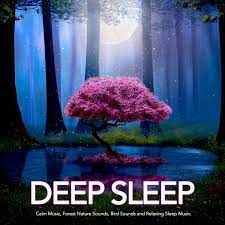Soothing Music to Sleep By: The Power of Relaxation
In today’s fast-paced and hectic world, getting a good night’s sleep has become more challenging than ever. Many of us struggle with racing thoughts, stress, and anxiety that can make it difficult to unwind and fall asleep. However, there is a simple yet effective solution that can help calm our minds and prepare us for a restful night: soothing music.
Music has long been recognized as a powerful tool for relaxation and stress reduction. When carefully selected, it can create a tranquil atmosphere that promotes deep sleep and rejuvenation. Soothing music works by engaging our senses, slowing down our heart rate, and inducing a state of calmness.
One genre of music that particularly stands out for its sleep-inducing qualities is ambient music. Ambient music is characterized by its gentle melodies, ethereal sounds, and minimalistic approach. It often incorporates nature sounds like raindrops or ocean waves, which further enhance the soothing effect.
The beauty of ambient music lies in its ability to create a peaceful environment conducive to sleep. By listening to this type of music before bedtime or even during the night, we can establish a bedtime routine that signals our brain it’s time to relax. As we immerse ourselves in the tranquil melodies, our breathing slows down, tension melts away, and our mind becomes more receptive to rest.
Moreover, soothing music can help drown out external noises that may disrupt our sleep. Whether it’s traffic sounds or noisy neighbors, wearing headphones or playing soft ambient tracks can provide us with much-needed tranquility and shield us from disturbances.
There are numerous platforms where you can find playlists specifically curated for sleep purposes. Streaming services like Spotify offer an extensive collection of ambient tracks designed to lull you into deep slumber. From classical compositions to modern electronic soundscape, there is something for everyone’s taste.
It’s important to note that while soothing music can greatly improve the quality of our sleep, it may not be a magic cure for chronic sleep disorders. If you consistently struggle with sleep issues, it’s always advisable to consult a healthcare professional.
Incorporating soothing music into your bedtime routine is a simple and enjoyable way to promote better sleep. So, the next time you find yourself tossing and turning in bed, reach for your headphones and let the calming melodies transport you to a place of tranquility. Discover the power of relaxation through soothing music and experience the rejuvenating benefits of a restful night’s sleep.
5 Frequently Asked Questions About Soothing Music for Better Sleep
- What type of soothing music is best for sleeping?
- How can I find calming music to help me sleep?
- What are the benefits of listening to soothing music before bed?
- Does playing soothing music at night really help you sleep better?
- How loud should I keep the soothing music when trying to sleep?
What type of soothing music is best for sleeping?
When it comes to choosing soothing music for sleeping, it ultimately depends on personal preference. However, certain genres and characteristics of music tend to be more commonly associated with promoting relaxation and sleep. Here are a few types of soothing music that are often recommended for bedtime:
- Ambient Music: Ambient music is known for its calming and atmospheric qualities. It typically incorporates soft, gentle melodies, soothing soundscapes, and minimalistic compositions. The serene nature of ambient music can help create a tranquil environment conducive to sleep.
- Classical Music: Classical compositions have long been recognized for their ability to induce relaxation. Pieces by composers such as Mozart, Bach, or Debussy often feature beautiful melodies and harmonies that can soothe the mind and promote a sense of calmness.
- Instrumental Music: Instrumental tracks without lyrics can be particularly beneficial for sleep as they minimize distractions and allow the mind to focus solely on the soothing sounds. Genres like instrumental piano, guitar, or flute can be incredibly relaxing and help ease tension before bedtime.
- Nature Sounds: Many people find solace in listening to nature sounds like raindrops falling, ocean waves crashing, or birds chirping. These natural sounds have a tranquilizing effect on the mind and can mask disruptive noises from the surroundings.
- Binaural Beats: Binaural beats involve playing two slightly different frequencies in each ear, which creates an auditory illusion that affects brainwave patterns. Certain frequencies are believed to promote relaxation and deep sleep when listened to through headphones.
Remember that everyone’s taste in music is unique, so it’s essential to experiment with different genres and styles to find what resonates best with you personally. Additionally, consider creating a playlist or using streaming platforms that offer pre-made sleep playlists designed specifically for relaxation and bedtime routines.
Ultimately, the goal is to find soothing music that helps you unwind, calms your mind, and prepares you for a restful night’s sleep.
How can I find calming music to help me sleep?
Finding calming music to help you sleep is easier than ever, thanks to the abundance of online platforms and streaming services. Here are a few tips to help you discover soothing tracks:
- Streaming Services: Popular music streaming platforms like Spotify, Apple Music, and YouTube Music offer curated playlists specifically designed for sleep and relaxation. Simply search for keywords like “sleep music,” “calming melodies,” or “ambient sounds” to find a variety of options.
- Ambient Music Channels: Explore ambient music channels on YouTube or other video-sharing platforms. Many creators compile hours-long mixes of calming tracks that are perfect for sleep. Look for channels with positive feedback and high subscriber counts to ensure quality content.
- Nature Sounds: If you prefer natural sounds like rain, ocean waves, or forest ambiance, search for nature sound playlists or albums. These can be found on streaming services or even as standalone apps dedicated solely to providing soothing nature sounds.
- Meditation Apps: Meditation apps such as Headspace, Calm, or Insight Timer often include sections with relaxing music specifically designed for sleep and relaxation. These apps usually offer a variety of guided meditations as well, which can further aid in relaxation before bedtime.
- Online Radio Stations: Explore online radio stations that focus on ambient or relaxation music genres. They often have scheduled programs dedicated to creating a peaceful atmosphere conducive to sleep.
- Recommendations and Reviews: Seek recommendations from friends, family members, or online communities who have similar taste in calming music. Reading reviews and testimonials can also help you discover new artists and albums that resonate with your personal preferences.
Remember that everyone’s musical taste is unique, so it may take some trial and error to find the specific genre or artist that helps you relax and fall asleep easily. Take your time exploring different playlists and tracks until you find the ones that create the perfect ambiance for your sleep routine.
What are the benefits of listening to soothing music before bed?
Listening to soothing music before bed offers a range of benefits that can significantly improve the quality of your sleep. Here are some key advantages:
- Stress reduction: Soothing music has a calming effect on the mind and body, helping to reduce stress and anxiety. It can help you unwind after a long day, allowing your mind to relax and let go of any racing thoughts or worries.
- Sleep induction: The gentle melodies and rhythms of soothing music can help lull you into a state of relaxation, making it easier to fall asleep. By creating a peaceful atmosphere, it prepares your mind and body for restful sleep.
- Improved sleep quality: Listening to soothing music before bed can enhance the overall quality of your sleep. It promotes deeper and more restorative sleep by regulating heart rate, reducing muscle tension, and slowing down brain activity.
- Masking external noises: If you live in a noisy environment or have trouble blocking out disruptive sounds, soothing music can act as a buffer by masking those noises. This allows you to focus on the calming soundscape rather than being disturbed by external factors.
- Establishing a bedtime routine: Incorporating soothing music into your bedtime routine creates a consistent ritual that signals to your brain that it’s time to wind down and prepare for sleep. Over time, this routine helps condition your mind and body for better sleep patterns.
- Increased relaxation response: Soothing music triggers the relaxation response in the body, releasing tension and promoting a sense of calmness. It can lower blood pressure, reduce muscle tension, and slow down breathing rate—all essential factors for achieving deep relaxation.
- Enhanced mood: Music has the power to evoke emotions and uplift our mood. By listening to soothing music before bed, you can create a positive emotional state that carries over into your sleep, leading to more pleasant dreams and an improved waking mood.
Remember that everyone’s preferences may vary when it comes to soothing music, so it’s important to explore different genres and styles to find what works best for you. Whether it’s classical compositions, ambient sounds, or gentle instrumental melodies, the key is to choose music that promotes relaxation and tranquility for a peaceful night’s sleep.
Does playing soothing music at night really help you sleep better?
Playing soothing music at night can indeed help improve the quality of your sleep. Here’s why:
- Calming Effect: Soothing music has a calming effect on our minds and bodies. It helps to slow down our heart rate, relax our muscles, and reduce stress and anxiety. By creating a peaceful atmosphere, it prepares us for sleep and helps us transition from a state of alertness to a state of relaxation.
- Drown Out Distractions: Playing soothing music can help mask or drown out external noises that may disrupt your sleep, such as traffic sounds or noisy neighbors. By providing a consistent and gentle background noise, it can create a more serene environment for sleep.
- Establishing Routine: Incorporating soothing music into your bedtime routine can signal to your brain that it’s time to wind down and prepare for sleep. Consistency is key when it comes to establishing healthy sleep habits, and having a regular routine that includes soothing music can train your mind to associate those sounds with relaxation and sleep.
- Reducing Racing Thoughts: Many people struggle with racing thoughts or an overactive mind when trying to fall asleep. Listening to soothing music can redirect your focus away from intrusive thoughts, allowing you to relax and drift off more easily.
- Enhancing Sleep Quality: Research has shown that listening to relaxing music before bed can enhance the overall quality of your sleep. It can promote deeper stages of sleep, increase the duration of REM (rapid eye movement) sleep – which is associated with dreaming and memory consolidation – and reduce the number of awakenings during the night.
While soothing music can be beneficial for most people, it’s important to note that individual preferences may vary. What works for one person may not work as effectively for another. It’s essential to find the type of music that resonates with you personally and creates a sense of relaxation.
Additionally, it’s crucial to maintain good sleep hygiene practices alongside incorporating soothing music into your routine. This includes having a consistent sleep schedule, creating a comfortable sleep environment, avoiding stimulating activities before bed, and practicing relaxation techniques.
If you consistently struggle with sleep issues or suspect an underlying sleep disorder, it’s always advisable to consult with a healthcare professional for proper evaluation and guidance.
How loud should I keep the soothing music when trying to sleep?
When using soothing music to help you sleep, it’s important to find the right volume that promotes relaxation without causing disturbance or hindering your ability to fall asleep. Here are some guidelines to consider:
- Keep it low: The volume of the music should be low enough that it serves as background noise rather than the main focus. You want it to be audible but not overpowering.
- Find a comfortable level: Experiment with different volume levels until you find what works best for you. Some people prefer slightly louder music, while others find softer, barely audible sounds more soothing.
- Mask external noises: If you live in a noisy environment or have trouble blocking out external sounds, slightly increasing the volume of the music can help mask those disturbances and create a more peaceful atmosphere.
- Avoid excessive volume: It’s crucial not to crank up the volume too high, as this can lead to auditory discomfort and potentially disrupt your sleep. Loud music may also stimulate your brain instead of promoting relaxation.
- Use headphones wisely: If you choose to use headphones while listening to soothing music, be cautious about the volume level. Opt for comfortable and noise-canceling headphones that allow you to keep the sound at a moderate level without straining your ears.
Ultimately, finding the ideal volume for soothing music is subjective and may require some trial and error on your part. Pay attention to how your body responds, ensuring that the music aids relaxation rather than becoming a distraction or hindrance to falling asleep peacefully.



